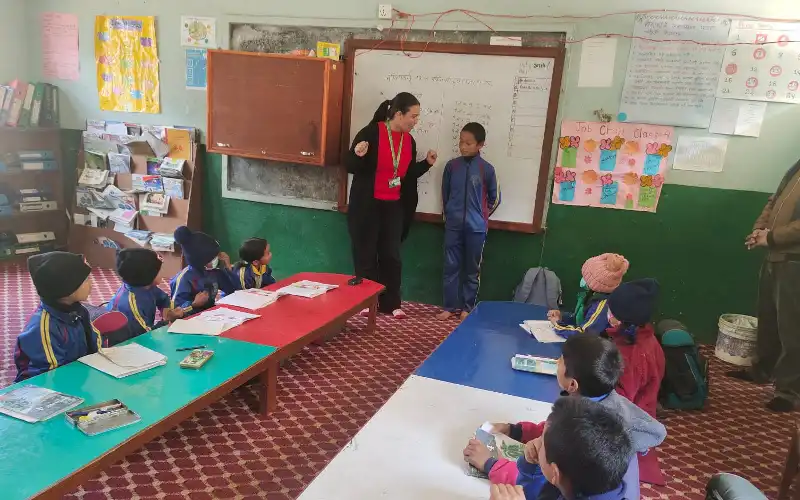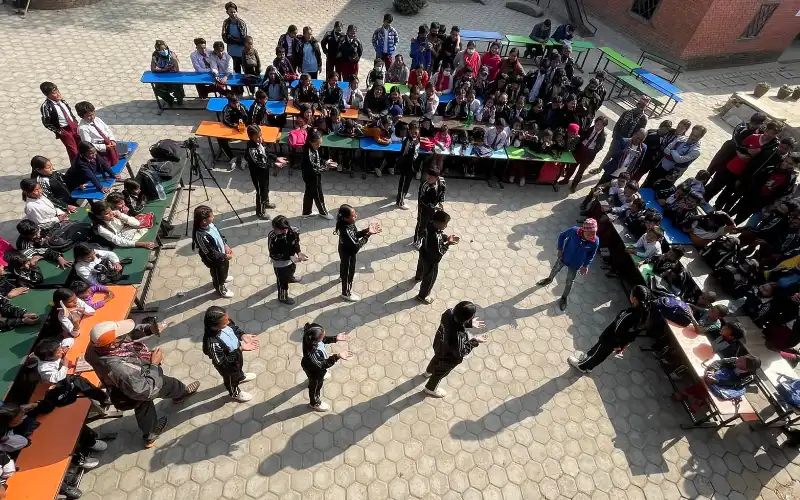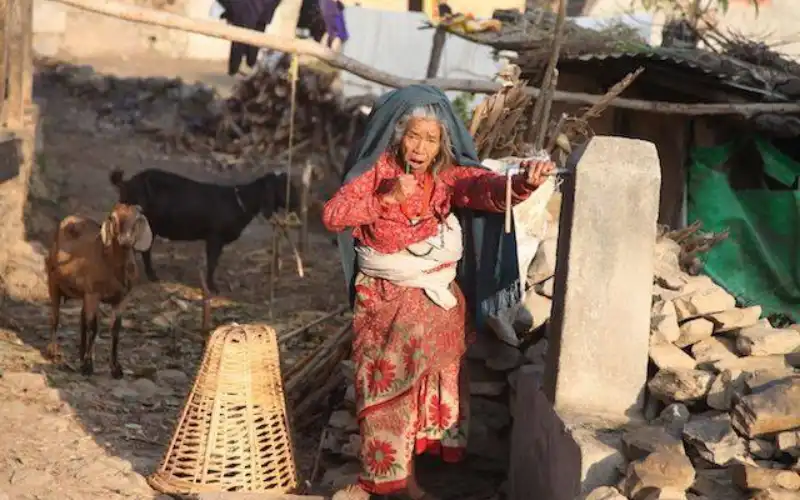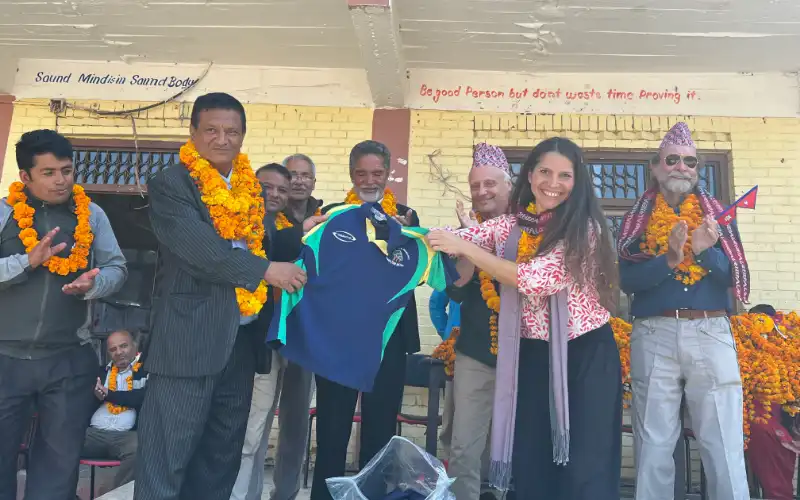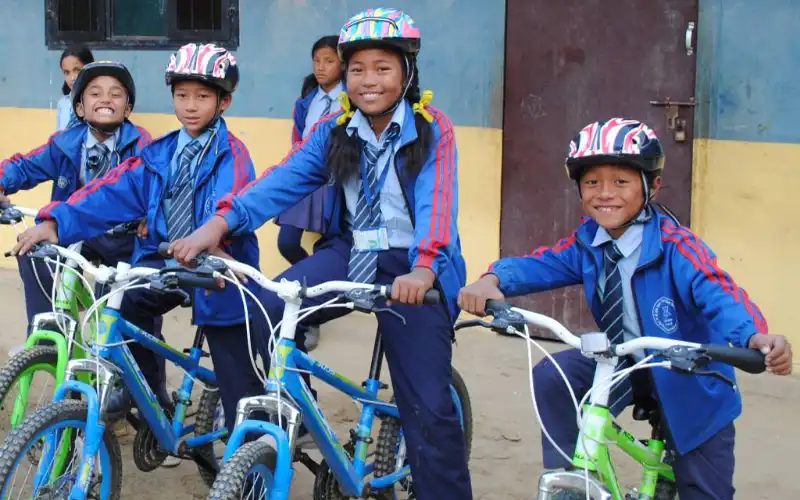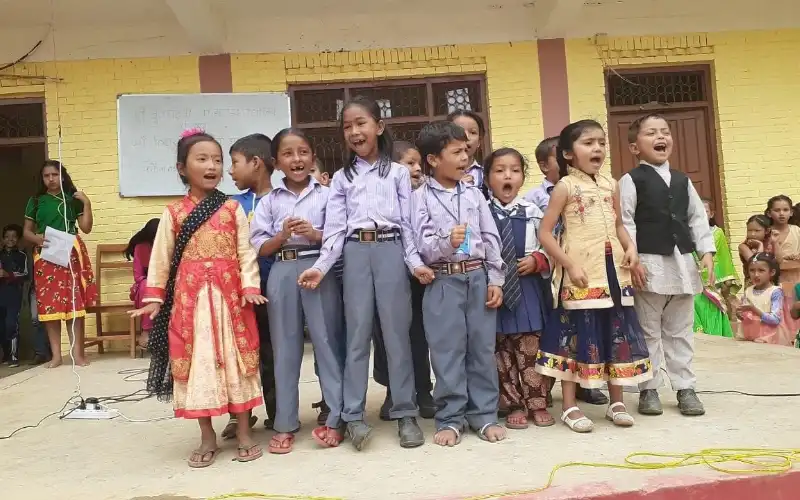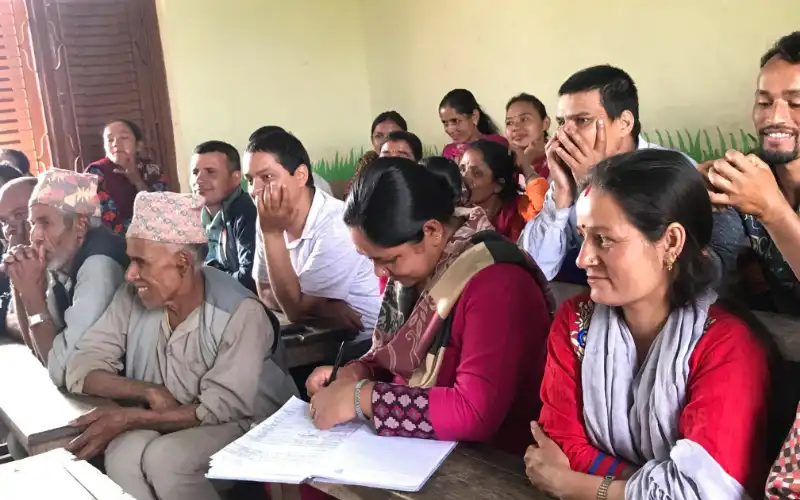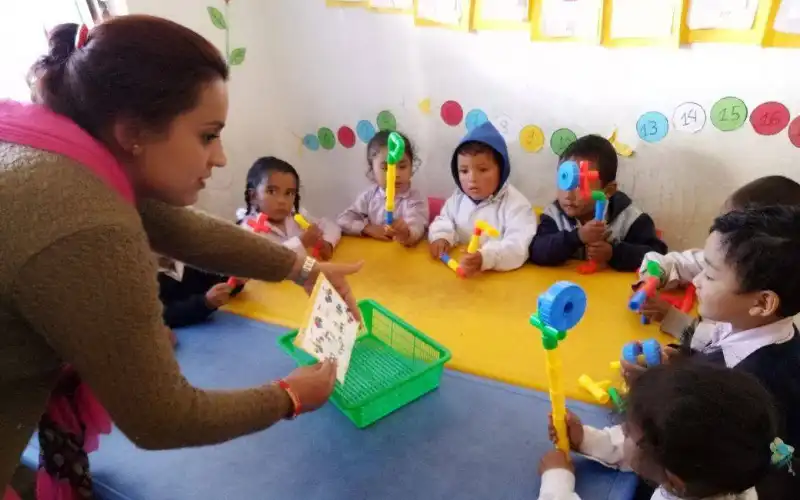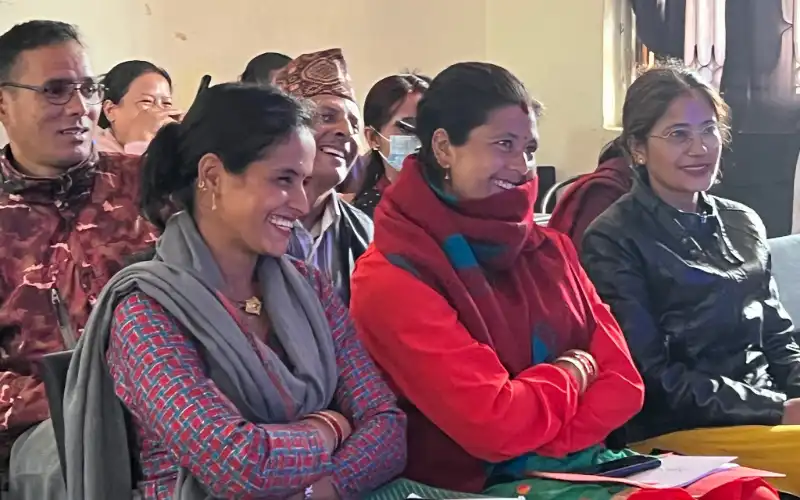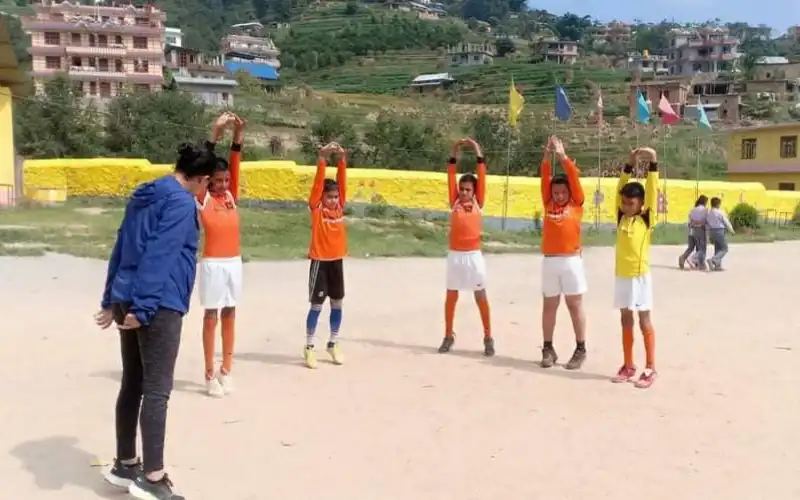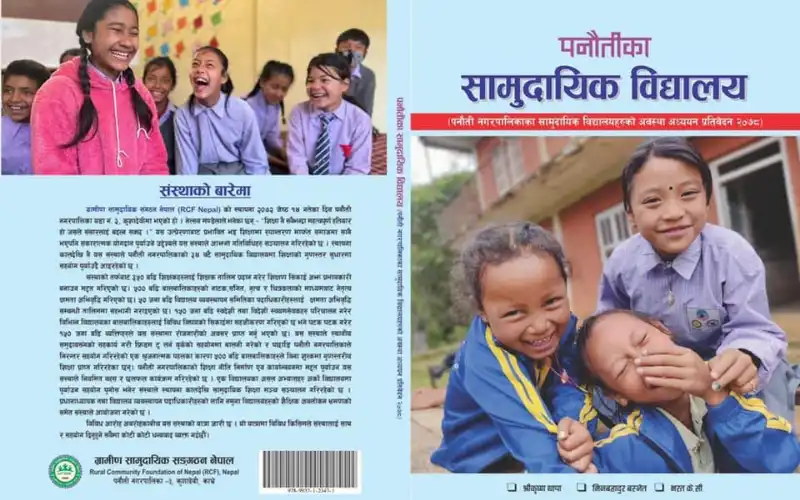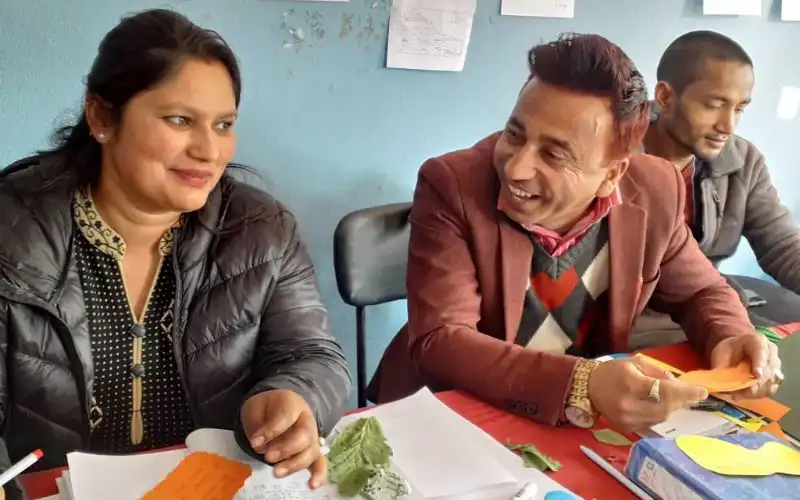FREEDOM TO LEARN PROJECT WORK
Our ‘Pillars of Work’ create the essential elements for our holistic approach to improving education for children and communities in Nepal.
Each of our projects is working towards the same goal of improving access to and providing quality of education, whilst also addressing the various barriers to education that children face.
Advocacy and Research Pillar:
– Act on Education (AoE):
AoE informs everything we do. This creative process, including Forum Theatre and Applied Drama Methods facilitates constructive dialogue between multiple stakeholders (by stakeholders we mean anyone that is impacted – so, children/parents/teachers/senior school leadership/education officials/local MPs/local businesses etc). The aim is to work out exactly what the problems are, and then work together to devise workable, sustainable and largely community led solutions.
– Environmental Education: A Pedagogy of Empowerment, Hope and Action (PEHA):
In Nepal, the impact of climate change is acute, adversely affecting lives with floods, forest fires, damaged crops and subsequent high levels of migration. In November 2023, UN Secretary-General António Guterres stated in his address to Federal Parliament in Kathmandu that, although people in Nepal cannot easily stop global emissions, they can understand the situation they face. They can prepare for changes effectively. He gave examples: flood barriers, ensuring crop irrigation or protection, and prevention of the damage of air pollution across Nepal. He was clear. Local changes can make a difference. This project, due to start in 2024, will equip local communities with the knowledge to make these changes, communicated through innovative educational initiatives.
Using our Act on Education model, we will instill an understanding of climate change and the tangible ways the young people themselves can change the future for the better. Young people will explore, design and implement various collaborative activities to face the climate crisis with confidence and informed action. We estimate outcomes to include: a multi-stakeholder collaborative crop protection scheme, multi school litter picks and river clearances, plastic usage campaigns and advocacy, leadership and innovation workshops and events, effective flood barrier constructions.
Learn about this project in more detail here.
– State of Education Research:
We have a small team of researchers who work to ensure there is reliable data on the state of government run schools in Panauti. This is used by us – highlighting areas of need, and informing our work. But, vitally, it also enables the local authority, and the district and national education offices to have reliable data on which to form their education policy and budget allocations. This is essential work, and helps to ensure that those schools and communities who need well run safe and productive schools, get the targeted support they need. This means education policy is more likely to be based in facts and actual need – rather than heresy and the persuasion of more powerful stakeholders.
Improving Quality of Education Pillar:
Teacher Training:
Exactly as the title suggests, we train teachers. Most Primary level teachers in Nepal are required to have participated in just 18 days of teacher training before taking their position as teacher. This leads to a vast disparity of teaching abilities. And often a lack of confidence in the classroom. The teachers we train are already in post, eager to gain more knowledge, skills and qualifications.
We partner with some of the best education organisations in Nepal, such as Kathmandu University and the esteemed Rato Bangla Foundation, as well as our in house trainers. We work diligently to provide evidence based and impactful training courses. Regularly managed communication throughout all training and support in subsequent months ensures sustained impact with teachers facilitating more engaging and interactive lessons with the techniques they have learned.
The wide variety of context relevant training modules include ‘Topic based and Creative Learning Techniques’, ‘Gender Equality in Education’ and ‘Child Protection and Welfare’, “Stimulating Classroom environments’, ‘Mental Health and Wellbeing’, ‘Discrimination in the Classroom’ and Classroom Management’, as well as more traditional curriculum based training.
Senior Management and School Governance Training:
Similar to all over the world, governors for schools are drawn from parents, teachers and local people, who do not necessarily have the experience of running a school and working effectively with local authorities. Our good governance training covers child protection, welfare and support; professional development; financial governance, and policies and procedures for enhancing access to education for the most vulnerable members of the communities. We also facilitate a network for over 180 school governors, exchanging knowledge and experience as well as policy formation support. We collaborate with the School Management Federation Nepal who actively engage in our training and support projects.
Early Childhood Development
Early Childhood Development Provision in Panauti is significantly insufficient.
One of the major complaints of Primary school teaching staff, (under significant pressure to support their students to improve academically) is that the children moving into their year groups are not developmentally on track, and therefore the foundational learning is not in place. This is especially true for the children from more marginalised backgrounds.
Although this issue was present pre-pandemic, Covid’s School Closures, resulting in 11 months missed school, has had a severe impact on the deprivation of educational gains. And the communities understanding and value placed on any education – especially Early Years Provision. Our data clearly demonstrates low morale amongst ECD teachers who feel ignored and undervalued. School management across Panauti report:
- Little appreciation of ECD and school education within the community due to economic uncertainty and perceived child labour needs.
- Lower classroom attendance (currently at a municipality average of 59%)
- Less confident students
- Reduced state real term funding.
- Significantly under-qualified and underpaid teachers.
- Dilapidated Classrooms and inadequate resources.
We train Early Childhood Development Teachers to a level where they are able to feel equipped and confident in their classrooms. Support them so they feel valued members of a school team, and in the wider community. And therefore have full engaging and impactful classrooms for children from some of the most marginalised sections of the community they serve. We also provide engaging and relevant resources, including the provision of appropriate classroom furniture, reading corners, play materials and sports equipment. The work results in more confident children who are transitioning smoothly into primary education.
Extra Tuition
The period of the COVID-19 Pandemic has caused the landscape of education in Nepal to change significantly. It has become even more difficult to provide good quality education for those that need it most. The lockdowns, as well as flooding and pollution from forest fires, has meant that Every child missed at least 11 months of school days across 2021-2022. Resulting in heavy learning losses for many of the children that we work with.
The community wide social, economic, and psychological impact has also been severe. Economic pressures have increased stress for hundreds of families who were already living below or on the poverty line. This has a direct impact on school attendance and environments. The students that we will we work with in this project are in the most vulnerable groups in terms of ethnicity and caste, and their families are at significant risk of being pushed back into poverty. As a result of these challenges, UNICEF estimates that in Nepal an estimated 2.2 million extra children will not be able to complete their education unless they receive some form of additional support (Unicef, 2021).
This is a project developed in direct response to the need right now in 2022 in Panuati. The educational impact experienced by children from particularly vulnerable and marginalised backgrounds in the more rural areas has had a detrimental impact not only on their academic prospects, but also their confidence and overall wellbeing.
We facilitate a Covid Response Tuition programme by mobilising 35 tutors to work with 525 children who have been identified as struggling academically. The wonderful tutors, who are young energetic volunteers, either 3rd year degree, or masters students, work regularly across 2 school catchments each, resulting in 6,300 sessions in any 3 month period.
Over 525 children regularly gain an educational boost in groups, and in 1:1 tuition leading up to their final year exams. Safeguarding, Emotional Support, and Stress Management are included.
As a result of our work in January – March 2022 75% of students showed significant improvements in their exam results. Teachers reported increased confidence and engagement in class. Parents visited the schools to show their gratitude – a significant endorsement of the work as parents don’t often value the government schools’ provision. Every single school we worked with have asked us to repeat the programme which we plan to do until there is no need.
Improving Access to Education Pillar:
Resource Provision:
This does exactly what it says on the tin. Where there are not enough education resources provided by the Nepali Education Authority we provide what is needed for learning in a quality classroom.
This includes well equipped reading corners with Nepali and English enticing and fun books, copy books, stationery, sports and play materials. The resources we provide are context relevant, and not disposal (in fact some of our teacher training includes how to use available resources in the environment such as from natural materials for art, or drawing in the sand for fun maths classes)
The materials promote creativity, free-play, reading and sport, which in turn increase mental and physical health outcomes, and increased engagement with core curriculum subjects.
Music, Dance, Art and Sport:
Arts Sports are an intrinsic part of any society – bringing joy, exploration, connection and understanding. Sadly many of the students in government schools are not offered any extra curricular arts activities. This project changes that.
We offer weekly workshops for children from primary through to 16 yrs. Creative, energising, thought provoking and confidence building, these subjects are an essential element to any quality education. This is an essential element to our mission to improve quality education. We ensure that all children, no matter their background or ethnicity, can experience earn creatively, energetically, in teams and the cultural skills in Music, Dance, Art and sport.
Family Outreach:
Our team of teachers and management staff make regular visits to hamlets across the municipality. This is to generate good relationships, mutual understanding and increase the value of schools and their service to the community. This is fundamental to making sure that each school is a thriving heart of the community serving the children and their families in the best way possible.
Before the Outreach project visits, parental engagement in schools was very low, sometimes teachers would not see any parents for weeks on end. Without parents knowing and valuing the school there could been meaningful communication, and vitally, little understanding between school staff and the wider community. Our data was shlwing that low parental engagement equals low attendance. There is a direct correlation.
We now have regular family events in school, parent teacher meetings, end of term picnics. Our outreach team also identify some of the families most in need of support. Many of the families who live and work in our school catchments, especially after the earthquakes of 2015, the increased droughts and heavy rains playing havoc on crops, the pandemic, increased fuel prices and forest fires have a lot to contend with to ensure that they can have enough food, healthcare, a home. All the basics that so many of us take for granted. The Family Outreach project helps us to make sure we can support our students families when they need it the most.
Global Citizenship and Responsibility Pillar:
In Green: Sister Schools Programme:
This project involves carefully facilitated collaborations between UK and Nepali schools, with by structured educational programmes. Using video chats, students form personal connections and work on shared projects like community campaigns and cultural celebrations. Freedom to Learn runs assemblies and workshops focusing on Nepali culture, global citizenship, and various social issues. By the end of the program, students gain a strong sense of global citizenship and appreciation for cultural diversity. The project currently benefits 12 schools, working with over 300 children, promoting understanding and reducing stereotypes, ultimately contributing to a more just and sustainable world.
This work nurtures a keen global awareness and empathy through the direct interaction and shared experiences. UK pupils learn about global issues such as poverty, climate change, and cultural differences and similarities, which encourages them to take social action. Meanwhile, Nepali children practice their English and share their experiences, which is crucial for their future education and employment. They all gain real-world experiences through the live link-ups and cultural exchanges, breaking down barriers and building relationship skills. This project also helps UK children value their own educational opportunities and see themselves as active partners in supporting and contributing to the work of Freedom to Learn by fundraising.
